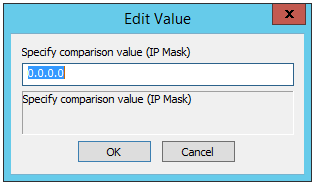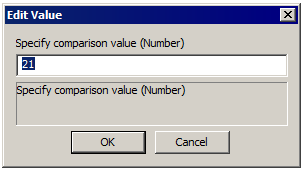Connection Conditions
You can apply these Conditions to Connection Events, File system Events, and certain User Events. (By default, IP Access-related Event Rules are limited to 1000 rules.)
-
If Remote IP—a connection is made from a remote IP address that matches/does not match an IP address or IP mask.
-
In the Rule Builder, click the linked text to specify whether the remote IP address does or does not match [ip mask].
-
Click [ip mask] to open the Edit Value dialog box.
-
Specify an IP address or and/or wildcards, and then click OK to add the Condition to the Event trigger.
-
If Local IP—a connection is made to a local IP address that matches/does not match an IP address or IP mask.
-
In the Rule Builder, click the linked text to specify whether the local IP address does or does not match [ip mask].
-
Click [ip mask] to open the Edit Value dialog box.
-
Specify an IP address or and/or wildcards, and then click OK to add the Condition to the Event trigger.
-
If Local Port—a connection is made/not made on a port/range of ports.
-
In the Rule Builder, click the linked text to specify whether the port number does/does not equal to, greater than or equal to, less than, less than or equal to [value].
-
Click [value] to open the Edit Value dialog box.
-
Specify a port number, and then click OK to add the Condition to the Event trigger.
-
If Protocol—Trigger the Rule when a specific protocol is used or not used.
-
In the Rule Builder, click the linked text to specify whether the protocol does/does not equal to [ftp/ssl/tls/sftp/http/https/as2/adhoc].
-
Click [ftp/ssl/tls/sftp/http/https/as2/adhoc] to open the Connection Protocol dialog box.
-
Click the Select connection protocol drop-down list to select the protocol (or specify Any Protocol).
-
Click OK.
-
If HTTP Query String—does/does not contain/equal to <string>. Specify a string; enclosing quotes are not needed
-
If HTTP Headers List—does/does not contain/equal to <string>. Specify a string; enclosing quotes are not needed


